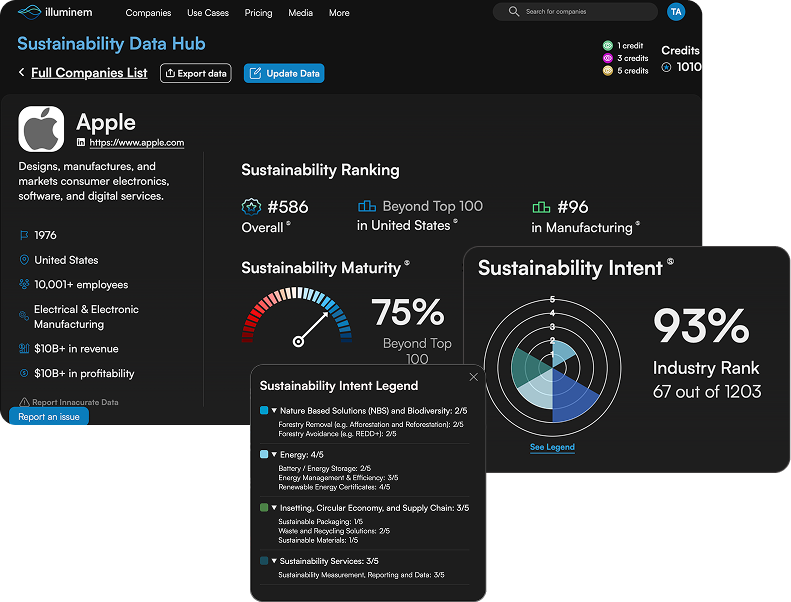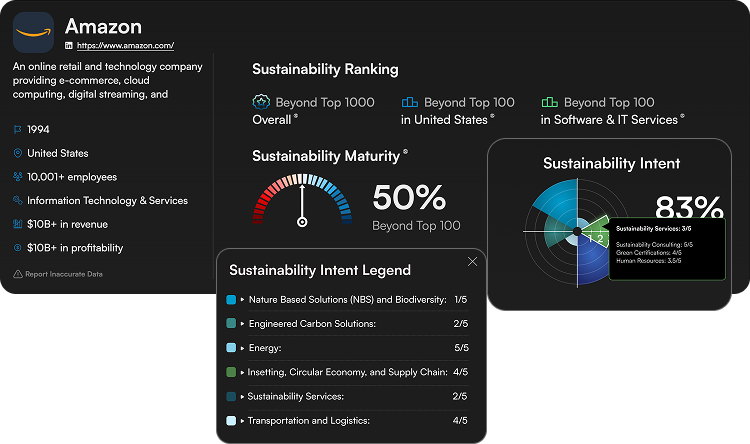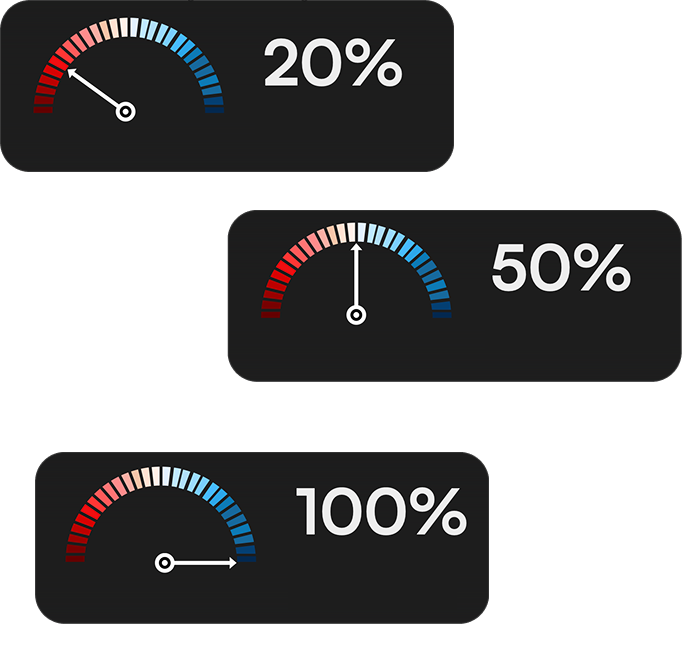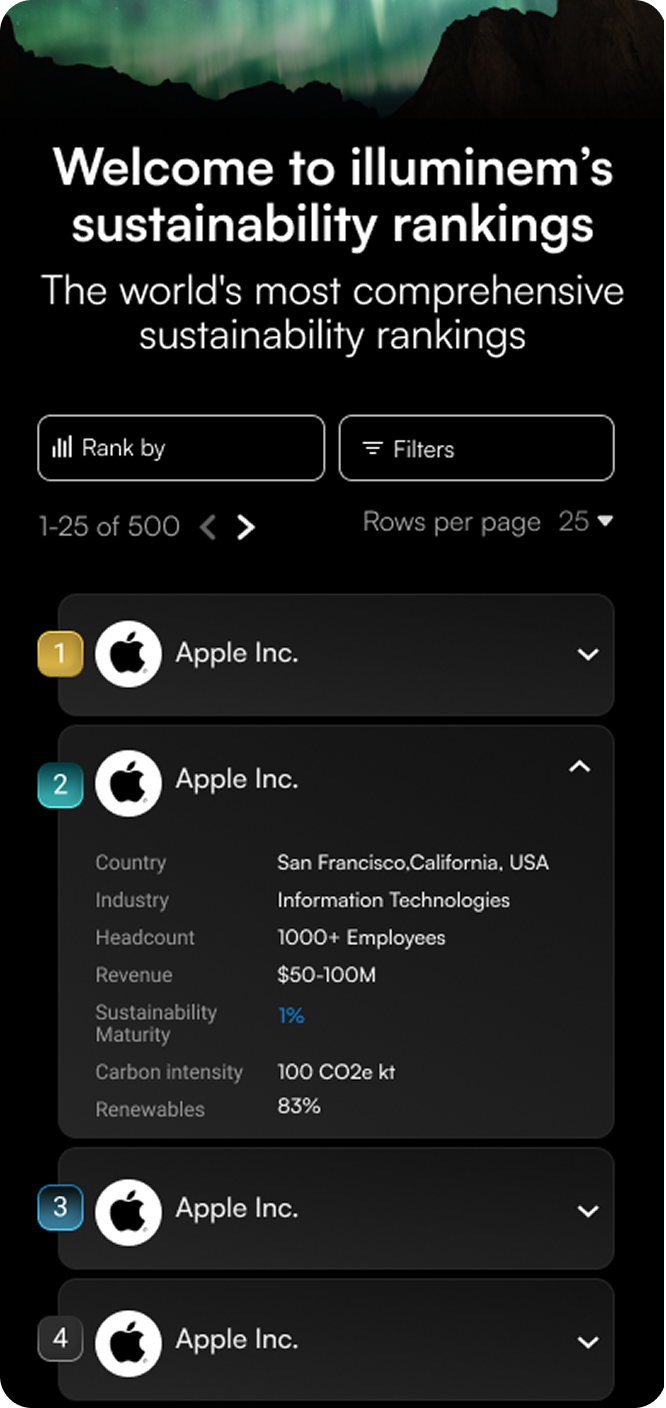Methodology behind our proprietary KPIs
Intent score
The forward-looking sustainability investment score
Intent reflects a company's likelihood to invest in sustainability solutions, based on:
- Employee signals
- Buying history
- Public statements and progress against publicly committed targets
- Stakeholder pressure
📈 High intent companies show clear signs of pursuing sustainability solutions soon.
To better understand a company's intent, we break it down into 30+ solution categories (e.g. Nature Based Solutions, Energy) and subcategories (e.g. Afforestation, Biochar).

Example:
Amazon is a clear high sustainability intent company:
- Investing in Nature-Based Solutions (e.g. forest conservation, carbon removal projects)
- Being the largest corporate buyer of renewable energy globally
- Investing in electric delivery fleets and low-carbon logistics
- Partnering with sustainability tech firms for supply chain carbon tracking

Maturity score
The universal sustainability score
Maturity measures how advanced a company is in its sustainability journey.
This is used as the primary score of illuminem rankings.
- Low maturity: Companies in early stages, focused on compliance or reputation, mainly driven by regulations.Examples: Oracle, ExxonMobil
- Medium maturity: Companies have integrated sustainability into their core strategy, with active investments in sustainability initiatives and certifications.Examples: Philip Morris, General Motors
- High maturity: Sustainability is embedded into the business, driving long-term value and innovation. Companies prioritize sustainability as a competitive advantage, with solutions like circular economy models, and sustainable product innovations.Examples: Mastercard, STMicroelectronics

Methodology behind our score
We transparently rank companies by sustainability maturity using a weighted mix of key criteria:
- [60%] Environmental Performance: Measures carbon emissions intensity and renewable energy use, normalized by industry. Companies lacking transparency or providing inaccurate numbers (greenwashing) are ranked in the bottom quartile.
- [30%] Organizational Buy-In: Assesses verification by respected bodies like SBTi, UN Global Compact, and B-Corp, as well as the company's commitment to high sustainability standards (e.g., breadth/depth of reporting and size of the sustainability team).
- [10%] Targets: Evaluates the breadth, depth, and ambition of publicly committed sustainability targets and pledges.
- [Penalization up to -15%] Controversies: Applies penalties for companies with active lawsuits, including cases of greenwashing, child labor, environmental harm and safety failures—based on thousands of news and insights covered by illuminem media.
This approach ensures illuminem's sustainability maturity ranking is both backward- and forward-looking, spotlighting companies that are leading — or rising fast — in sustainability.


Why use our KPIs
Identify leaders and rising stars
Highlight companies excelling today and those primed to lead tomorrow based on facts, not just communication.
Spot buying signals early
Uncover companies actively moving toward sustainable solutions — ideal partners or customers.
Benchmark with precision
Compare companies within their industry and peer based on the most insightful and the most comparable parameters.
Support smarter decisions
Equip businesses, investors, and partners with actionable insights, not just numbers, track progress (also against pledges).

Our KPIs offer a 360° view — blending strategy, action, and future intent — so you can focus on companies that are serious about sustainability, not just those with impressive past reports.

Nominate a company
Would you or any company you know be interested in being part of our rankings?
Our rankings grow with the community. We invite professionals and companies to nominate firms to be included in our rankings. Join us in empowering the sustainable transition.
NominateGet In Touch!
We welcome your comments, feedback, and suggestions to help us improve

